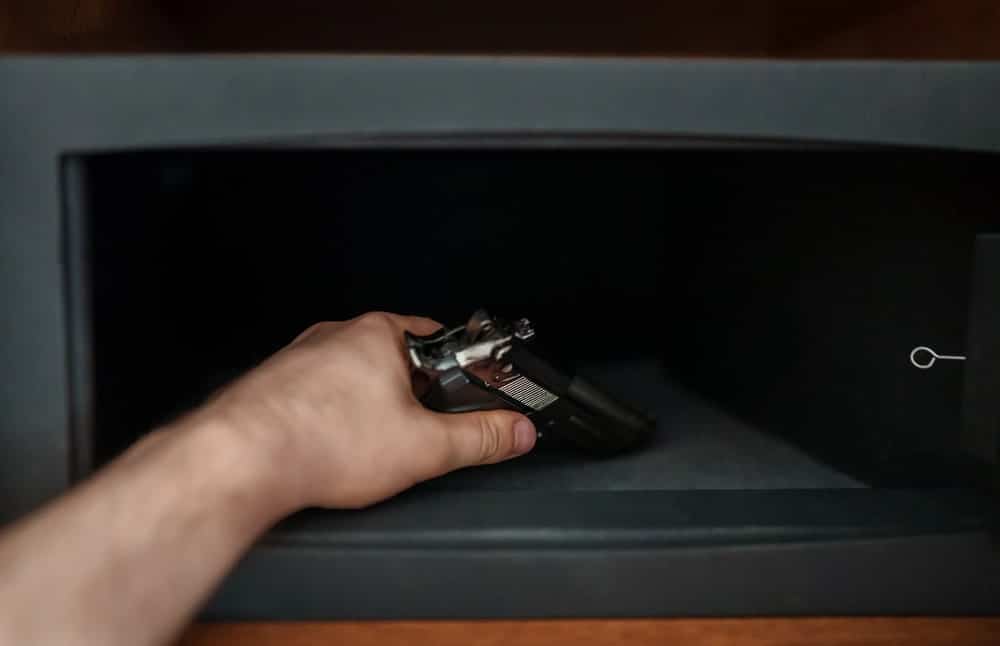Gun-Weapon Offense Attorney Lebanon & Mt Juliet TN

Experienced Lebanon and Mt. Juliet Tennessee Attorneys
Gun and weapon allegations in Lebanon, TN, often begin suddenly, leaving people unsure how a single encounter turned into a criminal charge. The State enforces Tenn. Code Ann. § 39-17-1307 with strict attention, and even first-time defendants can feel the weight of consequences that escalate quickly. Speaking with a gun lawyer in Lebanon at the earliest stage provides direction when every step carries meaningful impact.
Firearm-related accusations may involve possession issues, transport mistakes, restricted-area violations, or actions that officers interpret as threatening or unsafe. Depending on the circumstances, a conviction can bring jail time, probation terms, mandatory programs, loss of firearm rights, and a criminal record that affects daily life for years. Early guidance from a gun-weapon offenses attorney in Lebanon helps people avoid choices that complicate the outcome long before they realize it.
Lannom & Williams supports clients through every stage of these cases with careful and experienced representation. Attorney Frank Lannom’s three decades of criminal-defense work give clients a sense of stability when facing unfamiliar legal pressure. His insight helps individuals understand how firearms charges move through Tennessee courts and what must be done to protect long-term interests.
Reaching out before answering questions from law enforcement remains one of the most protective steps a person can take. Clear instructions from a knowledgeable defender prevent avoidable statements and safeguard important rights from the start. Our firm offers steady guidance and practical answers so clients can move forward with confidence and a clearer understanding of their options.
Understanding Gun & Weapon Charges Under Tennessee Law
Firearm Rules and Restricted Locations
Tennessee permits individuals to carry without a permit, yet several strict location-based limits remain in place. These restrictions apply to schools, courthouses, and designated government areas where weapons are forbidden by statute. Many charges begin when someone unintentionally enters a restricted zone or misinterprets a direction given during a police encounter.
Definitions That Shape How Cases Are Classified
State law describes a “firearm” as any tool designed to discharge a projectile using explosive force. A “deadly weapon” includes objects that can inflict serious injury through typical use or handling. A “prohibited weapon” refers to devices that the State bars entirely because their design creates a heightened risk to the public.
Mental State and How Courts Interpret Conduct
Judges also evaluate the accused person’s mindset to determine the appropriate charge. “Intent” reflects deliberate conduct involving the weapon, while “recklessness” points to careless behavior that places others in danger. These distinctions affect how officers document the event and how prosecutors frame the allegations.
Key Tennessee Statutes and Available Defenses
State law covers unlawful possession, carrying in off-limits locations, and ownership of banned weapons, each carrying different levels of punishment. Tennessee also recognizes a limited self-defense allowance when a weapon is held solely for protective reasons. Careful review of these laws is essential because even small details can shift the seriousness of the charge.
Misdemeanor vs. Felony Weapon Offenses
Weapon-related accusations range from lower-level misdemeanors to offenses that qualify as felonies depending on the circumstances. Compliance with transport rules, secure storage requirements, and location-based regulations often determines whether a person remains within the law. Our firm helps clients understand these rules clearly to prevent choices that raise legal exposure.
Possession, Intent, and How Prosecutors Build Their Case
Possession cases typically focus on whether the weapon was merely present or connected to a planned action. Intent-to-use allegations lead to harsher penalties because prosecutors often tie them to concerns about public safety. Many middle Tennessee communities enforce these cases strictly, which makes early advice from a gun crime lawyer essential for identifying the safest path forward.

Types of Gun & Weapon Charges We Defend
Unlawful Carrying or Possession of a Weapon
Under Tenn. Code Ann. § 39-17-1307, unlawful carrying or possession is one of the most frequent firearm charges seen in Tennessee courts. These cases often begin during routine traffic stops or brief encounters where officers decide to search a person or vehicle. A gun lawyer in Lebanon helps people understand these rules before the situation grows more difficult. Individuals involved with controlled substances may also fall into this restricted category.
Officers check these factors quickly, which sometimes leads to errors. The law distinguishes between having a firearm on the person and having a handgun inside a vehicle. Penalties vary based on a person’s history and the circumstances surrounding the arrest. First-time offenders may face lesser consequences, while repeat offenders face stronger punishment.
Defenses often challenge the legality of the search that uncovered the weapon. Some cases involve unclear possession or shared spaces that create confusion. We examine each step to identify constitutional issues that may influence the outcome.
Possession of a Firearm by a Convicted Felon
Possession by a convicted felon is treated as a serious offense because the law views it as a high-risk situation. These cases often arise during brief stops or searches where officers discover a firearm unexpectedly. Many people feel overwhelmed because the penalties can be severe. The seriousness depends on the type of underlying felony.
Some cases require mandatory minimum sentences that limit a judge’s discretion. These penalties can affect employment, housing, and family stability for years. Early guidance is essential because small decisions may influence the entire case.
Our firm challenges constructive possession claims when officers rely on assumptions rather than clear evidence. These claims often involve shared vehicles or homes where several people have access. We also review stops that may not satisfy constitutional standards. Vehicle searches receive close attention because officers sometimes overstep legal boundaries. Small errors in procedure may affect how courts view the evidence. These details help build a strong defense grounded in clear facts.
Carrying a Firearm in Prohibited Places
Under Tenn. Code Ann. § 39-17-1306, carrying a firearm into a prohibited place is a charge many responsible gun owners never expect. These cases often happen when someone enters a restricted area without noticing posted signs. Even small oversights can lead to significant consequences. Tennessee restricts firearms in schools, courthouses, federal buildings, and on posted private property. Many people charged under this law did not intend to violate any rule.
Defenses often focus on unclear signage or a lack of proper notice. Some buildings use signs that do not meet legal standards under Tennessee law. These details matter when determining whether the charge is appropriate. Other defenses examine how the firearm was stored or concealed during the visit. Courts may consider these facts when deciding penalties.
Our firm reviews each element to present a clear and accurate picture of what happened. We help clients understand how these rules work and why the charge developed. This guidance supports informed decisions throughout the process.
Possession of Prohibited Weapons
Under Tenn. Code Ann. § 39-17-1302, Possession of prohibited weapons involves items that the State classifies as too dangerous for personal use. Many people arrested under this law are surprised because they did not know the item was illegal. These misunderstandings can occur quickly and without warning. Examples include explosive weapons, machine guns, short-barreled shotguns, short-barreled rifles, and certain knives.
Each category has clear definitions that officers must follow. Misclassification happens when officers rely on appearance rather than technical details. Penalties vary depending on how the weapon was found and whether the person has a prior record. Some cases involve felony consequences that affect a person’s future in significant ways. Early review of the object is essential because the statutory definitions are very specific.
Our firm evaluates whether the seized item truly meets the legal definition of a prohibited weapon. We also review how officers handled the seizure, including storage and documentation. Errors in this process may weaken the State’s evidence. These concerns shape the overall defense strategy.
Firearm Use During the Commission of a Dangerous Felony
Tennessee adds strict penalties when prosecutors claim a firearm was used during a dangerous felony. These enhancements increase sentencing ranges even when weapon involvement is disputed. Many people do not realize how quickly these allegations appear during early investigation stages.
Crimes in this category include robbery, burglary, drug trafficking, and aggravated assault. Each offense becomes more serious when the State links it to a firearm. These enhancements often create the most significant risk in the case. Mandatory minimum sentences apply when prosecutors prove firearm use. These penalties remove the possibility of early release or reduced sentencing.
Defense strategies center on disputing whether the firearm played any role in the alleged felony. Some cases involve unclear evidence that leaves room for reasonable doubt. Other cases show that the weapon was not connected to the event. We examine statements, recordings, witness accounts, and forensic reports closely. These materials often reveal gaps or assumptions in the State’s theory.
Juvenile Weapon Charges
Juvenile weapon charges involve special rules designed to balance accountability with rehabilitation. Many cases begin with school incidents or misunderstandings involving peer pressure. Families often feel overwhelmed when these accusations appear suddenly.
Common charges include minors carrying firearms without permission or possessing weapons on school property. These cases can affect a young person’s future rights and opportunities. Schools may also impose their own disciplinary actions during the legal process. The court’s goal is usually to protect the child’s long-term future. Programs such as counseling, diversion, or supervision often replace harsh penalties. These options support growth rather than punishment.
Our firm works to keep juvenile records sealed or diverted whenever possible. We highlight family support, education needs, and community resources that show the child’s potential. These details help the court understand the full context. We guide families through each step with clear explanations and practical direction. Early involvement helps protect the child’s opportunities and prevents long-term harm.
Accidental Violations Involving Permitless Carry Laws
Tennessee’s permitless carry rules create confusion because they apply differently depending on the location. Many adults may carry without a permit, but strict limits still control where firearms can be held. These limits often lead to accidental violations when people believe the law offers broader protection.
Most accidental violations occur during routine traffic stops when officers unexpectedly find a firearm. Others happen when someone enters posted private property without noticing the restriction. Some cases develop when a person carries while drinking, which Tennessee law clearly prohibits.
These cases usually involve misunderstandings rather than intentional wrongdoing. A gun lawyer in Lebanon can explain how a lack of notice, unclear signage, or no intent affects the situation. We also examine constitutional concerns to identify issues that may influence how the evidence should be viewed.
Weapon Enhancements Added to Non-Weapon Crimes
Weapon enhancements increase penalties when a firearm or deadly weapon appears during a separate offense. These cases can involve assault with a deadly weapon, domestic violence involving a firearm, or drug possession with a weapon present. Even a simple burglary becomes more serious when officers claim a weapon was involved.
These enhancements can convert misdemeanor conduct into felony charges with lasting consequences. Courts treat these cases seriously because prosecutors argue that weapons increase public risk. People often feel shocked because the underlying offense may be minor, yet the enhancement increases the stakes quickly.
Defense strategies focus on disproving possession, intent, or any actual use of the weapon. A gun crime lawyer can review whether the firearm was accessible or linked to the event. We also examine statements, recordings, and officer conduct to challenge assumptions that shape the State’s case.

Penalties for Gun & Weapon Offenses in Tennessee
Gun and weapon offenses in Tennessee carry serious consequences, and the severity depends on the charge, the circumstances, and the individual’s record. Courts treat these cases with heightened concern because they involve public safety risks. Understanding the potential penalties helps individuals see what is at stake when facing these allegations.
Misdemeanor penalties may include:
- Up to 11 months and 29 days in jail
- Fines based on the specific charge
- Supervised probation with strict reporting requirements
These consequences often apply to offenses such as unlawful carrying or minor weapon violations. Even at the misdemeanor level, the impact can be long-lasting, especially when probation restrictions or employment issues arise.
Felony penalties are significantly harsher and may involve:
- One to more than 30 years in prison, depending on the felony classification
- Large fines that create long-term financial strain
- Mandatory minimum sentences, especially when the offense involves violence or repeat behavior
Felony gun offenses may include possession by a prohibited person, using a weapon during a crime, or carrying a firearm in restricted locations. These cases often receive aggressive prosecution.
Collateral consequences frequently include:
- Permanent loss of firearm rights under state and federal law
- Barriers to employment in many industries
- Strict probation conditions that limit travel or daily activities
- Immigration consequences for non-citizens, including possible removal
Weapon enhancements can drastically increase prison time when a firearm is present during another offense. These enhancements make early legal guidance essential. A skilled defense team helps individuals understand their exposure and pursue strategies that reduce penalties wherever possible.
How Lannom & Williams Defend Clients Facing Gun & Weapon Charges
Independent Review of Reports and Officer Accounts
Our firm opens every weapon case by conducting a thorough, independent evaluation of how the situation unfolded. We analyze arrest reports, officer narratives, and investigative summaries to pinpoint details that may affect the legal classification. This methodical review helps us understand the sequence of events and identify weaknesses that may support the defense.
Body-Cam, Dash-Cam, and Video-Based Analysis
We also examine digital evidence, including body-camera recordings, patrol-car footage, and any available surveillance or bystander video. These materials often reveal moments that differ from the written version of events or raise concerns about how the encounter was handled. A criminal defense lawyer in Lebanon uses this evidence to challenge assumptions that may unfairly influence the case.
Search Legality and Fourth Amendment Concerns
Searches connected to firearm allegations require special scrutiny because many charges arise from quick stops or roadside encounters. We study whether officers had a lawful basis to search a person, vehicle, or property under Tennessee law. When the search appears unsupported or improperly justified, we pursue motions to exclude evidence obtained through those violations.
Negotiation, Reductions, and Strategic Resolutions
Many gun and weapon cases offer paths toward reduced penalties, amended charges, or alternative outcomes depending on the facts. We work with prosecutors to secure reasonable resolutions that protect long-term goals and avoid unnecessary consequences. This approach helps clients reach outcomes that reflect fairness rather than rigid punishment.
Trial Preparation and Experienced Advocacy
When a case must proceed to trial, our team prepares with careful attention to each disputed detail. We question unreliable testimony, expose flawed procedures, and present evidence that clarifies what actually occurred. A gun-weapon offenses attorney in Lebanon relies on decades of courtroom experience to deliver strong advocacy across Wilson, Rutherford, Davidson, and surrounding middle Tennessee courts.

Why Choose a Local middle Tennessee Gun & Weapon Defense Attorney
Local Insight That Strengthens Your Defense
Hiring a middle Tennessee defense attorney offers significant advantages because each county handles weapon cases differently. Our firm understands how courts in Wilson, Rutherford, Davidson, and Williamson Counties apply firearm laws and manage daily procedures. This experience allows us to guide clients with advice shaped by real knowledge of how these cases progress in local courtrooms.
Efficient Communication and Faster Case Coordination
Regional familiarity also improves how quickly a case moves because nearby agencies operate with their own systems for warrants, filings, and scheduling. We maintain consistent communication with local officers and court staff, helping resolve issues before they delay the process. This practical advantage reduces stress and ensures clients stay informed as the case develops.
Community Awareness and Trusted Representation
Understanding how local jurors respond to weapon allegations plays a major role in shaping a strong defense. Our firm studies these patterns and prepares strategies that reflect how middle Tennessee communities typically view firearm-related evidence. Over decades, we have built a reputation for steady, personalized support that focuses on the client’s needs rather than a one-size-fits-all approach.
Take the First Step Toward Protecting Your Rights
Gun and weapon charges create immediate risks that demand fast legal action. These cases threaten your freedom, your record, and your ability to own a firearm in the future legally. A gun crime lawyer can explain your options before decisions are made that cannot be undone.
Our firm represents clients across Wilson County and throughout middle Tennessee with steady guidance at every stage. We focus on protecting your rights by reviewing the facts, challenging unfair evidence, and preparing a defense grounded in clarity.
To take the first step, contact Lannom & Williams or call us at (615) 444-2900 today to schedule a confidential consultation and speak with one of our skilled gun crime lawyers.
